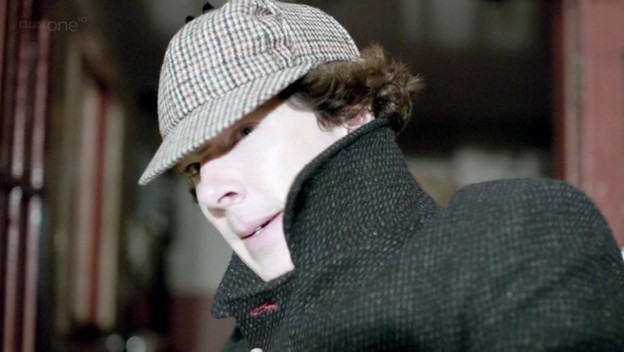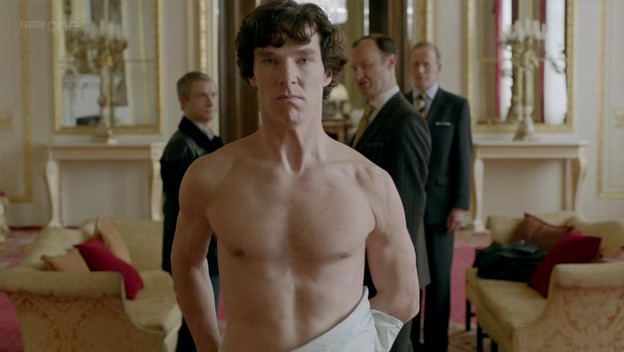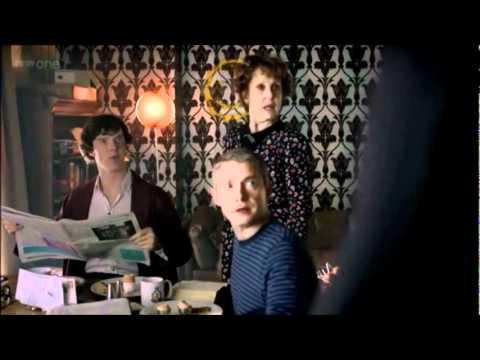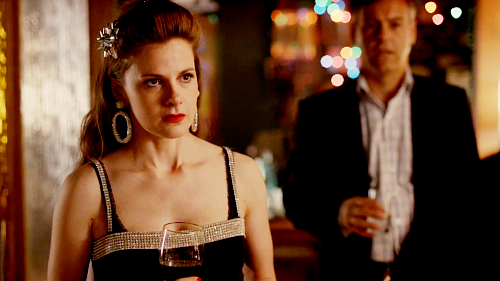A Scandal In Belgravia picks up right where The Great Game left off—and thank goodness for that because we waited a year to see what was going to happen at that pool—but we’re not going to discuss it just yet. We’re going to skip ahead to the near montage sequence of clips detailing Sherlock and Watson becoming famous. Yes, it seems everyone is reading The Personal Blog of Dr. John Watson, well, nearly 2,000 people a day. “This is your living, Sherlock,” Watson says, “not two hundred forty types of tobacco ash.” They’re solving cases left and right and the notoriety catches up with them in the form of a gaggle of press outside a crime scene. Lestrade warns them and they grab the nearest available hats on their way out the door, producing the iconic image of Sherlock in a tweed, ear-flapped cap—completely by accident.
 Love it. Love seeing them hijacked to Buckingham Palace. Love Mycroft pouring tea and stating, “I’ll be mother,” without irony and Sherlock responding, “And there is a whole childhood in a nutshell.” Been meaning to mention how much I love the elegant graphics highlighting Sherlock’s observations and revealing the machinations of his smart phone. I even love a stubbornly nearly naked Sherlock, ridiculous as the idea may be. But don’t you mess with Irene Adler.
Love it. Love seeing them hijacked to Buckingham Palace. Love Mycroft pouring tea and stating, “I’ll be mother,” without irony and Sherlock responding, “And there is a whole childhood in a nutshell.” Been meaning to mention how much I love the elegant graphics highlighting Sherlock’s observations and revealing the machinations of his smart phone. I even love a stubbornly nearly naked Sherlock, ridiculous as the idea may be. But don’t you mess with Irene Adler.
 Wait, I’m getting ahead of myself. You see, there’s a shady lady, a dominatrix, who has compromising photographs of one of the royals and Sherlock is tasked with retrieving them, no small feat in the digital age. He dresses as a clergyman and gets Watson to punch him in the face as they approach her residence, then pretends to be an innocent bystander in distress on her doorstep. But she knows he’s coming and greets him…naked…the joke being that with nothing on she gives away no clues in her appearance. Then she attempts to disorient him by asking about the case he was on before being dispatched to the palace. He plays along, bidding her to observe as he does.
Wait, I’m getting ahead of myself. You see, there’s a shady lady, a dominatrix, who has compromising photographs of one of the royals and Sherlock is tasked with retrieving them, no small feat in the digital age. He dresses as a clergyman and gets Watson to punch him in the face as they approach her residence, then pretends to be an innocent bystander in distress on her doorstep. But she knows he’s coming and greets him…naked…the joke being that with nothing on she gives away no clues in her appearance. Then she attempts to disorient him by asking about the case he was on before being dispatched to the palace. He plays along, bidding her to observe as he does.
“Any minute now something’s going to happen. What?” he asks.

“The hiker’s going to die,” she says.
“No,” he says, “that’s the result. What’s going to happen?”
“I don’t understand,” she says.
“Try to.”
“Why?”
“Because you cater to the whims of the pathetic and take your clothes off to make an impression,” Sherlock says. “Stop boring me and think. It’s the new sexy.”
Precisely, I say. This Irene Adler is both disappointing and offensive. Unfortunately this scene is almost the only similarity between the update and the original story, A Scandal In Bohemia. If you’ve been paying attention, you know it’s my favourite of Conan Doyle’s Sherlock Holmes stories and before you start, no, it’s not because it’s the one about a girl. Irene Adler was not a love interest. She wasn’t some tarted up, kinky grifter. And she certainly wasn’t in league with Moriarty. So, we’re halting the recap and we’re going to set the record straight.
Irene Adler, ‘the woman’, was the one person who outwitted Sherlock Holmes and the high esteem in which he holds her stems from this alone. Furthermore, she was respectable, a self-made woman of independent means. And, wait for it, she was American. (It’s not my favourite for that reason either, but if you’re American and you’ve ever spent more than an hour in the company of more than one British subject you understand the weight that detail carries.)
She did have one compromising photograph of one of Europe’s heads of state, which she was threatening to use against him…but only because she’d been in love with him and he’d promised to marry her and now he was marrying someone else. If you read between the lines you suspect this liaison gave her a reputation as a courtesan, so it makes sense that she might enjoy threatening to ruin his reputation in return. In the end she took the high road, finding her own happiness and quietly marrying another man who truly loved her. She was only keeping the photograph as insurance against any retribution from that no good liar, the king of Bohemia, who had hired a succession of robbers to secure the photo and finally Holmes. So, yes, he did dress up as a priest and fake a house fire to figure out her hiding place, but she saw right through him—even disguising herself as a boy and tailing him to his flat to confirm her suspicion. And before he was able to take the photo she left with it. But, class act that she was, she left a letter for Holmes along with a photo of herself alone for the king.
My favourite bit comes right after Holmes, Watson, and the king each read the letter.
“Would she not have made an admirable queen?” the king says. “Is it not a pity that she was not on my level?”
“From what I have seen of the lady she seems indeed to be on a very different level to your Majesty,” said Holmes coldly.
When Jeremy Brett says it, let me assure you, he sneers. And how cool is that? It’s egalitarian and populist and just. And that’s not all.
“I am immensely indebted to you. Pray tell me in what way I can reward you. This ring—” He slipped an emerald snake ring from his finger and held it out upon the palm of his hand.
“Your Majesty has something which I should value even more highly,” said Holmes.
“You have but to name it.”
“This photograph!”
The King stared at him in amazement.
“Irene’s photograph!” he cried. “Certainly, if you wish it.”
So congratulations Steven Moffat! Whatever your intent, you took a paragon of 18th century feminine prowess and turned her into a prostitute, a blackmailer, and, perhaps worst of all, just another stupid girl waiting by the phone. You ruined her for everyone.
But you’ve given us delectable tidbits concerning other characters in this episode. Yes, Mrs. Hudson finally gets her due when Mycroft refuses to suffer her scolding him,  “It’s a disgrace, sending your little brother into danger like that. Family is all we have in the end, Mycroft Holmes!” To which he laments, “Oh shut up, Mrs. Hudson!” Sherlock and Watson immediately, furiously call him on his error in protocol and, after a bit of squirming, he apologizes. An apology that Sherlock swiftly follows with, “Though do in fact shut up.” She also manages to outfox CIA agents who toss the flat and rough her up trying to obtain Ms. Adler’s camera phone, one of whom Sherlock throws out the window. “Lestrade? We’ve had a break-in at Baker Street. Send your least irritating officers and an ambulance,” says Sherlock, on the phone. “Oh, no no no no no, we’re fine. No, it’s the burglar. He’s got himself rather badly injured. Oh, a few broken ribs, fractured skull, suspected punctured lung. He fell out of a window.”
“It’s a disgrace, sending your little brother into danger like that. Family is all we have in the end, Mycroft Holmes!” To which he laments, “Oh shut up, Mrs. Hudson!” Sherlock and Watson immediately, furiously call him on his error in protocol and, after a bit of squirming, he apologizes. An apology that Sherlock swiftly follows with, “Though do in fact shut up.” She also manages to outfox CIA agents who toss the flat and rough her up trying to obtain Ms. Adler’s camera phone, one of whom Sherlock throws out the window. “Lestrade? We’ve had a break-in at Baker Street. Send your least irritating officers and an ambulance,” says Sherlock, on the phone. “Oh, no no no no no, we’re fine. No, it’s the burglar. He’s got himself rather badly injured. Oh, a few broken ribs, fractured skull, suspected punctured lung. He fell out of a window.”
Then there’s Christmas drinkies with Molly showing up in an evening gown and too much makeup. Sherlock picks up on her trappings right away. Too bad he’s oblivious to their aim.
“Oh come on, surely you’ve all seen the present at top of the bag?” Sherlock observes. “Perfectly wrapped with a bow, all the others are slap-dash at best—someone special then. Shade of red echoes her lipstick, either an unconscious association or one that she’s deliberately trying to encourage. Either way, Miss Hooper has loooove on her mind. The fact that she’s serious about him is clear from the fact that she’s giving him a gift at all—that would suggest long-term hopes, however forlorn. And that she’s seeing him tonight is evident from her makeup and what she’s wearing—obviously trying to compensate for the size of her mouth and breasts—”
 That’s right, he’s so taken with his own cleverness, it takes him that long to figure out the perfectly wrapped present is for him.
That’s right, he’s so taken with his own cleverness, it takes him that long to figure out the perfectly wrapped present is for him.
“You always say such horrible things,” Molly says, completely humiliated with everyone watching. “Every time. Always. Always.”
“I am sorry. Forgive me,” Sherlock says with grave sincerity, “Merry Christmas, Molly Hooper.” And he leans in and kisses her cheek.
Watson has clearly never heard Sherlock apologize to anyone before and it’s written all over his shocked face. Then again he spends much of this episode bewildered. He seems to think Sherlock capable of romantic feeling and, with Mycroft’s help, tries to protect his sentimental attachment to Ms. Adler. That confuses me. Then there is this notion that Sherlock and Irene are in the business of rescuing each other—she calling to distract Moriarty that crazy night at the pool and he popping up in the Middle East to prevent her beheading. I don’t find it particularly plausible or satisfying. But I do like this bit of dialogue between Mycroft and Watson near the end.
“My brother has the brain of a scientist or a philosopher yet he elects to be a detective. What might we deduce about his heart?” asks Mycroft.
“I don’t know,” says Watson.
“Neither do I,” admits Mycroft. “But initially he wanted to be a pirate.”
All in all I’m conflicted because there’s a lot of fun to be had in this episode. If it were a story that’s not about Sherlock Holmes and Irene Adler I’d probably love it. Then again, that’s the insult I used to compare those Robert Downey, Jr films to this series on Monday.

